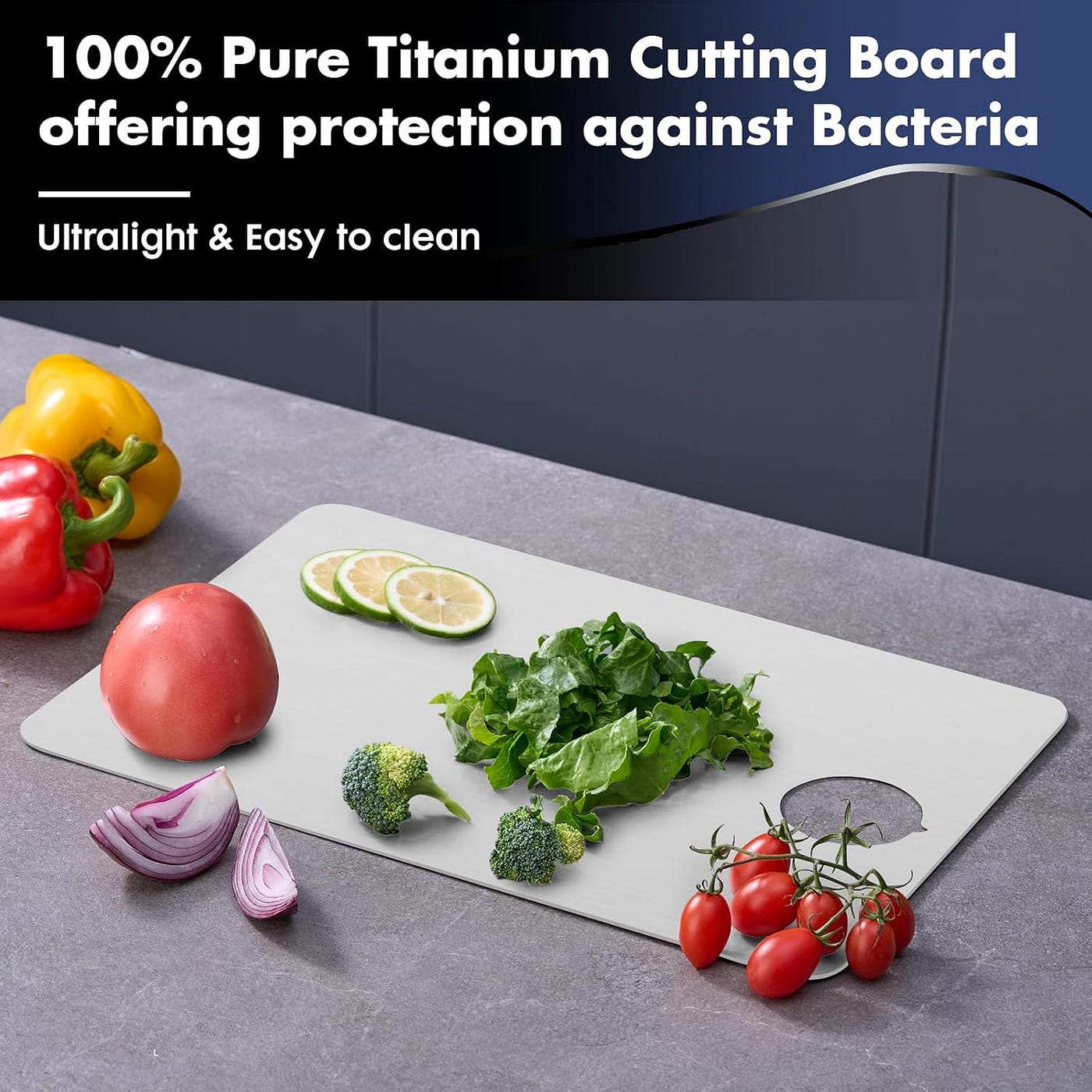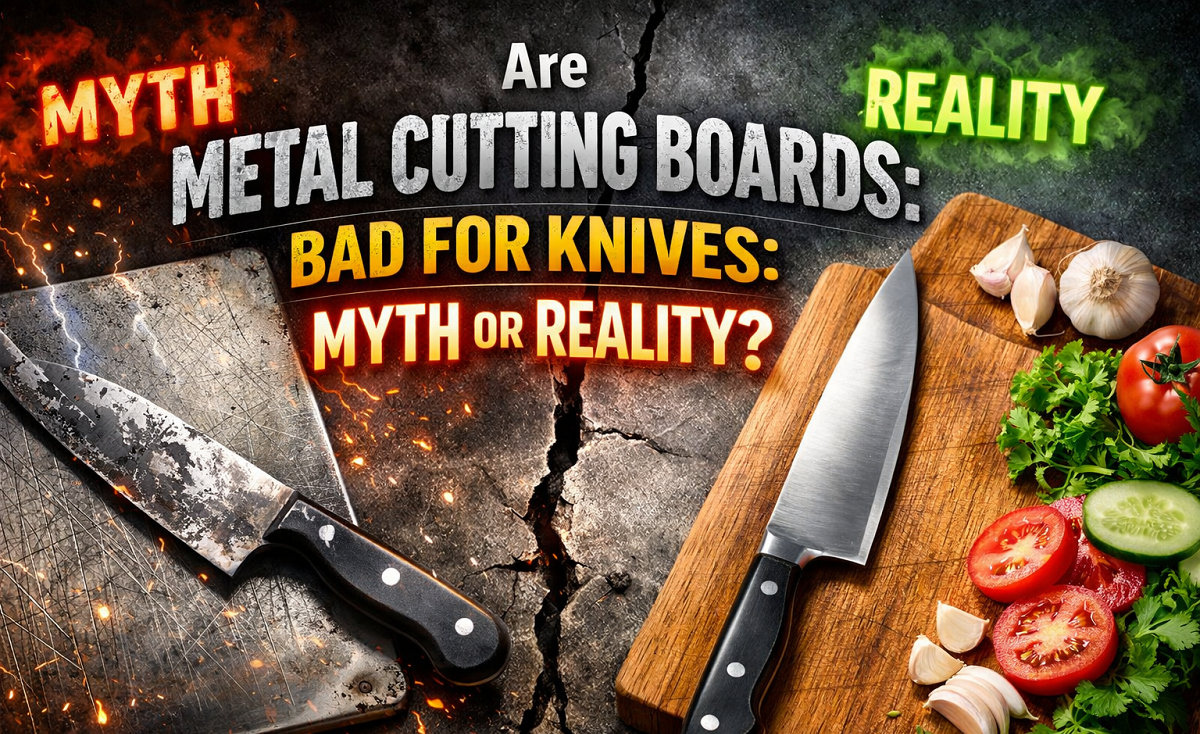Are you worried that using a metal cutting board might be ruining your knives? You’re not alone.
Many home cooks and professional chefs wonder if metal boards are tough on their blades—and if they’re making their knives dull faster than they should. The truth is, the type of cutting board you choose plays a huge role in how long your knives stay sharp.
But what makes metal cutting boards stand out, and are they really as bad as people say? Keep reading to discover how metal boards affect your knives and what cutting surface will help you protect your investment in quality blades. Your knives deserve the best care, so let’s find out what that looks like.
You can also read: Best Stainless Steel Cutting Boards: Durable, Hygienic Options for Your Kitchen
Metal Cutting Boards And Knife Edges
Metal cutting boards stand out for their durability and easy cleaning. They resist stains and do not absorb odors. Despite these benefits, they raise concerns about knife damage. The hardness of metal surfaces can impact knife edges differently than wood or plastic. Understanding this impact helps choose the right board for your knives.
Knives rely on sharp edges for efficient cutting. The surface they cut on plays a key role in edge maintenance. Metal boards have a unique effect that can shorten a knife’s lifespan if not considered carefully.
Material Hardness Impact
Metal cutting boards are much harder than wood or plastic. This hardness means knife edges hit a tough surface during use. The knife edge may chip or bend slightly after repeated contact. Metals like stainless steel do not yield or soften under pressure. This leads to faster wear on the blade’s sharp edge. Soft materials allow the blade to slide in and out with less resistance. Metal boards offer no such give, causing more stress on the knife.
Effect On Knife Sharpness
Knife sharpness depends on a fine, intact edge. Each cut on a metal board can dull the blade quickly. Small chips and nicks form, making the knife less effective. Sharpening becomes necessary more often than with wood or plastic boards. Frequent sharpening reduces the overall life of the knife. Metal cutting boards do not protect the blade’s edge well. Knives lose their sharpness faster, requiring extra care and maintenance.
Common Myths Around Metal Boards
Metal cutting boards often face criticism based on beliefs that may not be fully accurate. Many people think metal boards are harsh on knives or hard to keep clean. These ideas can stop cooks from trying metal boards, even though some myths do not hold up under closer look.
Understanding these common myths helps make better choices for kitchen tools. Let’s explore some popular misunderstandings about metal cutting boards.
Durability Misconceptions
Many think metal cutting boards last forever without damage. Metal is strong and resists cracks or chips easily. But it can get scratched and dented over time, affecting its surface.
Some believe metal boards damage knives quickly. Metal is hard, so it can dull edges faster than wood or plastic. Yet, the real damage depends on how you use your knife, not just the board.
Proper technique and regular knife sharpening reduce wear, even on metal boards. So, durability myths often confuse board strength with knife safety.
Maintenance Challenges
People say metal boards are hard to clean or keep hygienic. Metal surfaces do not absorb liquids or odors, making them easier to sanitize than wood.
Metal boards can show scratches where bacteria might hide, but thorough cleaning solves this issue. Stainless steel boards resist stains and do not warp like wood.
Some worry about rust on metal boards. High-quality stainless steel resists rust well. Simple drying after washing keeps the board safe and clean.
Best Cutting Board Materials For Knives
Choosing the right cutting board material is key to keeping knives sharp and lasting longer. Some materials wear down knife edges faster, while others protect the blade. Understanding the best options helps you care for your knives effectively.
End-grain Wood Benefits
End-grain wood boards use fibers that stand upright. The knife cuts between these fibers instead of against them. This action reduces dulling and preserves sharpness. These boards also have a self-healing effect, as the fibers close back after cutting. They look natural and add style to any kitchen. Regular oiling keeps the wood from drying and cracking. These boards cost more and weigh more but are worth it for serious cooks.
You can also read: Best Wood Cutting Boards for Knives: Top Picks for Every Kitchen
Synthetic Rubber Advantages
Synthetic rubber boards balance softness and durability well. They are gentle on knives and prevent quick dulling. Cleaning is easy, and they resist bacteria better than wood. Professionals often choose them for hygiene and knife care. One downside is they may slide on wet surfaces. Some worry about tiny plastic particles, but they remain a solid option for many kitchens.
Hard Plastic As A Budget Option
Hard plastic boards, usually made from polyethylene, offer a cheap and practical choice. They are tough and resist deep cuts better than softer materials. These boards clean easily and go in the dishwasher. However, deep cuts can trap bacteria, so replace them regularly. They do dull knives faster than wood or rubber but work well for everyday use.

Credit: yakushiknives.com
Materials To Avoid For Knife Care
Choosing the right cutting board is crucial for keeping knives sharp. Some materials cause more harm to knives than others. Avoiding certain surfaces can extend your knife’s life and maintain its edge. Here are materials to avoid for proper knife care.
Glass And Ceramic Risks
Glass and ceramic cutting boards are very hard surfaces. They do not absorb the impact of the knife blade. Instead, the blade hits a tough surface every time. This constant impact dulls the knife edge quickly.
Knives can also chip or develop small cracks on glass or ceramic boards. These materials offer no cushioning, which stresses the metal blade. Using glass or ceramic boards can lead to more frequent sharpening or even blade damage.
Metal Board Drawbacks
Metal cutting boards are another material to avoid. Metals like stainless steel are too hard for knife edges. Each cut on a metal board causes the blade to lose sharpness fast.
Metal boards can also cause small nicks and damage to the knife edge. The blade hits a surface that does not give or absorb pressure. This wear shortens the knife’s lifespan and reduces cutting efficiency.
Choosing The Right Board For Your Kitchen
Choosing the right cutting board for your kitchen affects your knives and food safety. The material of the board influences how long your knives stay sharp. It also impacts cleaning and hygiene. Picking a board that balances these needs is key for every home cook.
Balancing Durability And Knife Safety
Wood boards, especially end-grain types, protect knife edges well. Their fibers give way to the blade, reducing dulling. They also last long with proper care. Synthetic rubber boards offer softness and strength. They are gentle on knives and easy to clean. Plastic boards are affordable and dishwasher safe. They wear down faster and show knife marks more easily. Metal cutting boards are very hard and can dull knives quickly. Choosing a board means weighing durability against how it affects your knife’s sharpness.
Hygiene And Maintenance Tips
Wood boards need regular oiling to prevent cracking and warping. Clean them with mild soap and water, then dry thoroughly. Avoid soaking wood boards to stop bacteria growth. Synthetic rubber and plastic boards can be washed in a dishwasher. Inspect plastic boards often and replace if deep cuts appear. Metal boards are easy to clean but may harbor bacteria in scratches. Proper cleaning keeps all boards safe and extends their lifespan. Regular maintenance protects your knives and your health.
You may read:
Best Carving Boards: Perfect Gift Ideas for Dad’s Kitchen Needs
Best Non Toxic Wooden Cutting Boards: Top Picks for Safe Cooking
Best Cutting Boards for Japanese Knives: Preserve Sharpness & Quality
Best Non Toxic Bamboo Cutting Board: Elevate Your Kitchen Experience
Best Wood Cutting Board Non Toxic Options for Healthy Cooking

Credit: www.nytimes.com
Expert Opinions And User Experiences
Many people wonder if metal cutting boards harm knife blades. Experts and users have shared their views on this topic. Their opinions help us understand if metal boards are safe or damaging for knives.
Below, we explore what professional chefs say and what real users report about metal cutting boards and knife care.
Professional Chef Insights
Professional chefs mostly avoid metal cutting boards for daily use. They say metal boards are too hard on knife edges. The blade can dull faster after cutting on metal surfaces. Chefs prefer softer materials like wood or plastic. These materials protect the blade and keep knives sharper longer.
Some chefs use metal boards only for specific tasks. For example, when cutting very tough items or for quick prep. Still, they clean and sharpen knives more often. Most agree metal boards are not ideal for preserving blade life.
Consumer Reviews And Feedback
Many home cooks report metal boards dull their knives quickly. Users often notice the blade feels less sharp after several uses. Some mention the metal surface causes small chips or nicks on the blade. These issues reduce cutting precision and require more sharpening.
However, some users like metal boards for durability and easy cleaning. They accept the trade-off of more frequent knife maintenance. A few say metal boards are good for heavy-duty cutting but keep a wooden board for daily chopping.
Overall, user feedback suggests metal boards are tough on knives. Most recommend softer cutting surfaces to extend blade life and maintain sharpness.

Credit: medium.com
Frequently Asked Questions
What Is The Safest Cutting Board For Knives?
The safest cutting boards for knives are end-grain wood (maple, beech) and high-quality synthetic rubber. They protect edges and are durable. Hard plastic boards work but need replacing when deeply scored. Avoid glass, ceramic, and metal boards as they dull knives quickly.
What Cutting Board Does Not Blunt Knives?
End-grain wood boards like maple and beech protect knives by allowing blades to glide between fibers. Synthetic rubber boards are also gentle and durable. Avoid glass, ceramic, and metal boards as they quickly dull knife edges. Hard plastic is a budget-friendly, knife-safe option.
What Type Of Cutting Boards Should Be Avoided?
Avoid glass, ceramic, and metal cutting boards. They dull knives quickly due to their hard surfaces. Choose wood or high-quality synthetic boards instead.
Do Stone Cutting Boards Dull Knives?
Stone cutting boards dull knives quickly because their hard surface resists blade edges. Choose softer materials like wood or plastic to keep knives sharp longer.
Conclusion
Metal cutting boards damage knives fast due to their hard surface. Knives lose sharpness quickly when used on metal boards. Softer boards like wood or synthetic rubber protect knife edges better. These materials help knives stay sharp longer and make cutting easier.
Choosing the right board saves money on knife sharpening or replacement. Avoid metal boards if you want sharp knives for a long time. Keep your kitchen knives safe by using gentle cutting surfaces. Your knives will thank you with better performance every day.

